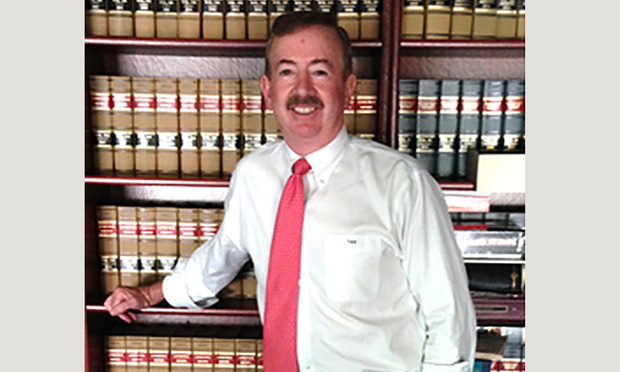Former Attorney Thomas Murtha Denied Compassionate Release From Prison
A federal judge this week denied a compassionate request from prison plea from former Connecticut attorney Thomas Murtha, who was sentenced to 78 months in prison for stealing about $2 million from clients and family members.
July 30, 2020 at 12:11 PM
3 minute read
 Thomas Murtha. Courtesy photo
Thomas Murtha. Courtesy photo
A Connecticut federal judge has denied former attorney Thomas Murtha's compassionate release from prison, finding he has not shown he's especially vulnerable to COVID-19.
In turning down the request Monday afternoon, U.S. District Judge Michael Shea said the 64-year-old Murtha has not definitively shown he is prone to getting the novel coronavirus at the Ashland Federal Correctional Institute in Kentucky. Murtha is serving 78 months in prison for stealing about $2 million from clients and relatives.
In his July 1 request for compassionate release, Murtha said he is at high risk for serious illness or death from COVID-19 because of his age, potential lung damage from asbestos exposure and high cholesterol.
While Murtha attached a medical record indicating he was exposed to asbestos while working on the warden's home in October 2019, Shea said Murtha in a medical questionnaire a month later said he was never exposed to asbestos and "had never experienced any chest illness or lung issues, and considered himself to be in good health."
While Murtha said in his request for compassionate release that it's not unusual for defendants who have underlying health issues to be released early from prison for nonviolent crimes, both the government and Shea said the former attorney hurt many people.
Shea wrote that Murtha "was a lawyer who grossly abused the trust that his clients, his friends and family, and society as a whole placed in him. He did so repeatedly, in a variety of ways, and all to serve his own selfish interests—leaving dozens of traumatized victims in his wake."
Shea continued: "His conduct also damages the legal profession by eroding the trust our society places in lawyers. His clients and the others he victimized likely will never trust lawyers, or the legal system, again, even when they may need to. … Indeed, his release would promote disrespect for the law."
Murtha was a partner and managing member of the now-defunct Maher & Murtha. At sentencing after pleading guilty to one count of wire fraud, Shea ordered Murtha to pay $1.99 million in restitution, and to forfeit his interest in a house he owned in Michigan and a 2.11-carat diamond engagement ring the government said he improperly seized.
Murtha, who practiced law from 1981 to 2016, resigned from the Connecticut Bar in September 2016 after three grievance complaints accused him of defrauding multiple people.
Murtha is represented by Moira Buckley, an assistant federal defender in Hartford. Buckley didn't respond to a request for comment Thursday.
In addition, Thomas Carson, spokesman for the U.S. Attorney's Office in Connecticut, declined to comment.
Related stories:
Bridgeport Attorney Sentenced to 78 Months for Stealing About $2 Million From Clients, Relatives
'Such a F—ing Hard Time': A Look at Attorneys Behaving Badly in 2018
This content has been archived. It is available through our partners, LexisNexis® and Bloomberg Law.
To view this content, please continue to their sites.
Not a Lexis Subscriber?
Subscribe Now
Not a Bloomberg Law Subscriber?
Subscribe Now
NOT FOR REPRINT
© 2025 ALM Global, LLC, All Rights Reserved. Request academic re-use from www.copyright.com. All other uses, submit a request to [email protected]. For more information visit Asset & Logo Licensing.
You Might Like
View All

Apple Disputes 'Efforts to Manufacture' Imaging Sensor Claims Against iPhone 15 Technology
Trending Stories
- 1'A Death Sentence for TikTok'?: Litigators and Experts Weigh Impact of Potential Ban on Creators and Data Privacy
- 2Bribery Case Against Former Lt. Gov. Brian Benjamin Is Dropped
- 3‘Extremely Disturbing’: AI Firms Face Class Action by ‘Taskers’ Exposed to Traumatic Content
- 4State Appeals Court Revives BraunHagey Lawsuit Alleging $4.2M Unlawful Wire to China
- 5Invoking Trump, AG Bonta Reminds Lawyers of Duties to Noncitizens in Plea Dealing
Who Got The Work
J. Brugh Lower of Gibbons has entered an appearance for industrial equipment supplier Devco Corporation in a pending trademark infringement lawsuit. The suit, accusing the defendant of selling knock-off Graco products, was filed Dec. 18 in New Jersey District Court by Rivkin Radler on behalf of Graco Inc. and Graco Minnesota. The case, assigned to U.S. District Judge Zahid N. Quraishi, is 3:24-cv-11294, Graco Inc. et al v. Devco Corporation.
Who Got The Work
Rebecca Maller-Stein and Kent A. Yalowitz of Arnold & Porter Kaye Scholer have entered their appearances for Hanaco Venture Capital and its executives, Lior Prosor and David Frankel, in a pending securities lawsuit. The action, filed on Dec. 24 in New York Southern District Court by Zell, Aron & Co. on behalf of Goldeneye Advisors, accuses the defendants of negligently and fraudulently managing the plaintiff's $1 million investment. The case, assigned to U.S. District Judge Vernon S. Broderick, is 1:24-cv-09918, Goldeneye Advisors, LLC v. Hanaco Venture Capital, Ltd. et al.
Who Got The Work
Attorneys from A&O Shearman has stepped in as defense counsel for Toronto-Dominion Bank and other defendants in a pending securities class action. The suit, filed Dec. 11 in New York Southern District Court by Bleichmar Fonti & Auld, accuses the defendants of concealing the bank's 'pervasive' deficiencies in regards to its compliance with the Bank Secrecy Act and the quality of its anti-money laundering controls. The case, assigned to U.S. District Judge Arun Subramanian, is 1:24-cv-09445, Gonzalez v. The Toronto-Dominion Bank et al.
Who Got The Work
Crown Castle International, a Pennsylvania company providing shared communications infrastructure, has turned to Luke D. Wolf of Gordon Rees Scully Mansukhani to fend off a pending breach-of-contract lawsuit. The court action, filed Nov. 25 in Michigan Eastern District Court by Hooper Hathaway PC on behalf of The Town Residences LLC, accuses Crown Castle of failing to transfer approximately $30,000 in utility payments from T-Mobile in breach of a roof-top lease and assignment agreement. The case, assigned to U.S. District Judge Susan K. Declercq, is 2:24-cv-13131, The Town Residences LLC v. T-Mobile US, Inc. et al.
Who Got The Work
Wilfred P. Coronato and Daniel M. Schwartz of McCarter & English have stepped in as defense counsel to Electrolux Home Products Inc. in a pending product liability lawsuit. The court action, filed Nov. 26 in New York Eastern District Court by Poulos Lopiccolo PC and Nagel Rice LLP on behalf of David Stern, alleges that the defendant's refrigerators’ drawers and shelving repeatedly break and fall apart within months after purchase. The case, assigned to U.S. District Judge Joan M. Azrack, is 2:24-cv-08204, Stern v. Electrolux Home Products, Inc.
Featured Firms
Law Offices of Gary Martin Hays & Associates, P.C.
(470) 294-1674
Law Offices of Mark E. Salomone
(857) 444-6468
Smith & Hassler
(713) 739-1250












